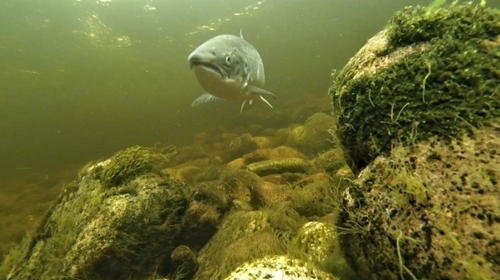
A new paper entitled “Using Food Webs and Metabolic Theory to Monitor, Model, and Manage Atlantic Salmon—A Keystone Species Under Threat“ provides an insightful exploration of how we might combine data and theory to develop new modelling approaches to predict and manage how Atlantic salmon will respond to future changes.
Led by Guy Woodward at Imperial College London and published in the journal Frontiers in Ecology and Evolution, the paper includes the Missing Salmon Alliance Principal Investigator Colin Bull and Rasmus Lauridsen (Head of Fisheries Research for GWCT) amongst its 15 authors.
The paper sets out a need for developing new mechanistic modelling approaches that make use of data-gathering initiatives, such as those being delivered by the Missing Salmon Alliance (missingsalmonalliance.org). The paper also emphasis how large scale international research projects such as SAMARCH (samarch.org), are integral to providing a greater understanding of the growth and survival of salmon at sea. It outlines how understanding key aspects of the food web and environmental drivers affecting salmon life stages enables us to forecast responses to changes more accurately and facilitates future salmon management.
The paper calls for more joined-up Atlantic salmon research, a more holistic approach to continue to identify bottlenecks in the life-cycle and drivers thereof helping to direct focussed and effective management solutions. This all falls directly in line with the Missing Salmon Alliance’s mission: to drive action to save our wild Atlantic salmon from extinction by combining expertise, coordinating activities, and advocating effective management solutions.
The paper can be read in full here: https://www.frontiersin.org/articles/10.3389/fevo.2021.675261/full
Paper Citation:
Woodward, G., Morris O., Barquín J., Belgrano A., Bull C., de Eyto E., Friberg N., Guðbergsson G., Layer-Dobra K., Lauridsen R., Lewis H., McGinnity P., Pawar S., Rosindell J., O’Gorman E. 2021. Using Food Webs and Metabolic Theory to Monitor, Model, and Manage Atlantic Salmon—A Keystone Species Under Threat. Frontiers in Ecology and Evolution, 9. DOI=10.3389/fevo.2021.675261, https://www.frontiersin.org/article/10.3389/fevo.2021.675261